
If you’re looking to explore your ethnic and geographical roots, both FamilyTreeDNA and 23andMe provide comprehensive ancestry insights that can help you learn more about your heritage.
Both services offer valuable details, such as ancestry composition, DNA matches, and family tree-building tools, along with other unique features. Deciding between the two can be difficult, so one of our researchers personally tested both options, carefully assessing factors like accuracy, cost, and added features.
Ultimately, both FamilyTreeDNA and 23andMe are strong choices for uncovering your ancestral origins and connecting with distant relatives.
What Are the Testing Options?
Both companies provide DNA tests that examine your DNA to determine your ethnic and geographical origins and locate DNA matches. To assist you in selecting the appropriate test, let’s briefly examine the testing options available.
FamilyTreeDNA offers four DNA tests:
- Family Finder – Examines your autosomal DNA to uncover a breakdown of your ancestry, identify unknown relatives, and determine the ancient European groups you descend from.
- Y-DNA Test – Reveals the ancestry and ancient migrations of your paternal lineage. Multiple Y-DNA tests are offered, which analyze varying amounts of Y-chromosome DNA. Exclusively for biological males.
- mt-DNA Test – Traces your direct maternal line back to Africa and uncovers the ancient migration paths of your female ancestors.
- Family Finder + myDNA Wellness – Offers the same service as Family Finder, with the addition of health and wellness insights.
23andMe provides two DNA tests:
- Ancestry Service – Analyzes autosomal, mtDNA, and Y-DNA to determine your ethnic and sub-regional ancestry. It also identifies maternal and paternal haplogroups. Additionally, it reveals your genetic predisposition for over 30 traits.
- Health + Ancestry Service – Includes all features of the Ancestry test, along with genetic risk and carrier status reports for over 50 conditions and diseases. It also provides wellness reports that shed light on how your body responds to various lifestyle factors.
DNA Test Kits – Saliva or Swab?
I personally ordered ancestry DNA test kits from various companies to understand their offerings directly, and the kits arrived quickly.
Each kit comes with everything needed: sample collection materials, a return package, and straightforward instructions.
No matter which test you select, you’ll be reminded to avoid eating, drinking, brushing teeth, chewing gum, or smoking for 30 minutes before sample collection (or 1 hour in the case of FamilyTreeDNA). This step is crucial to ensure the sample isn’t contaminated or insufficient.
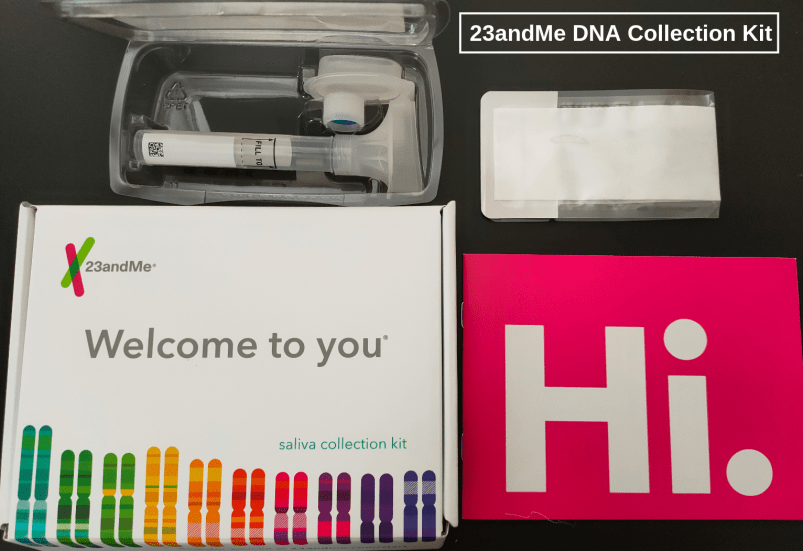
The 23andMe test requires you to provide a saliva sample, while the FamilyTreeDNA test requires you to swab the insides of your cheek with a textured cotton swab. Each sample method is easy and takes less than five minutes, but I personally found the cheek swab method more comfortable than spitting into a tube a bunch of times.
It’s important to register your kit before you send it to the lab. This not only enables the lab to connect the kit to your online account, but also allows you to keep track of your samples from receipt at the lab, through analysis, to completion.
Prepaid packaging is provided with 23andMe. FamilyTreeDNA will also cover the cost of returning your samples, but only in the US. If you’re outside the US you must cover the cost of shipping, which may prove to be expensive if you choose an express option.
FamilyTreeDNA vs. 23andMe – How Do They Compare?
As expected, both 23andMe and FamilyTreeDNA provide a breakdown of your ethnic and geographical origins. Both companies do this by analyzing short sections of your autosomal (inherited from both parents) DNA and comparing it to reference populations with established ancestry.
I found the ethnicity estimate from 23andMe to be more precise as they have more reference populations with over 1,400, compared to just 90 from FamilyTreeDNA. This allows 23andMe to pinpoint your ancestry down to 0.1%, even picking up trace ancestry from Sudan and North Africa, that I’ve not seen in another report.
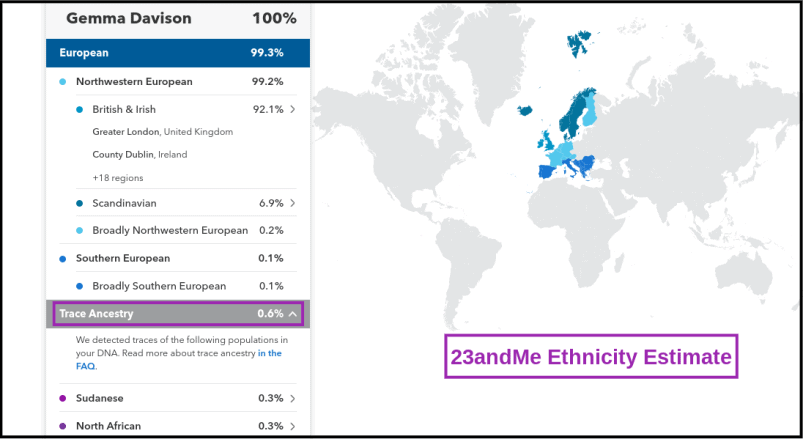
Plus, 23andMe delves deeper into your sub-regional ancestry, being able to trace your recent ancestry (the last 200 years) down to the county level. That’s not to say that FamilyTreeDNA doesn’t go a little deeper than the continent and country level. They have recently added 60+ new family finder populations, which includes a number of African, American, and European regions.
Both 23andMe and FamilyTreeDNA offer the opportunity to explore your ancient ancestry by identifying your maternal and paternal haplogroups through the analysis of your mtDNA (mitochondrial DNA) and Y-DNA (Y-chromosome), respectively. These tests can connect you to a common ancestor who lived tens of thousands of years ago and help trace the migration patterns of your ancient maternal and paternal lines.
23andMe includes maternal and paternal haplogroup identification in all of its ancestry tests. However, with FamilyTreeDNA, you must purchase mtDNA and Y-DNA tests separately, which can increase the overall cost.
It’s important to understand that Y-DNA testing, offered by both companies, is only available to biological males since biological females don’t have Y chromosomes. If you’re a biological female and want to learn about your paternal haplogroup, you can ask a close male relative to take the 23andMe Ancestry Test or a Y-DNA test through FamilyTreeDNA.
And the winner is…23andMe! FamilyTreeDNA came close, but 23andMe just edges out the competition by offering autosomal, mtDNA, and Y-DNA testing in a single kit for a low price.
However, if you’re interested in digging deeper into your paternal and maternal ancestry, FamilyTreeDNA has individual Y-DNA and mtDNA tests, which include advanced insights thanks to full sequence testing, plus DNA matching to mtDNA and Y-DNA databases.
Find DNA Matches From Your Maternal and Paternal Lines with FamilyTreeDNA
Both companies have extensive DNA databases with FamilyTreeDNA having over 2 million users and 23andMe having more than 12 million. Your autosomal DNA is compared to samples in the database to find your DNA matches and potential relatives.
With each provider, you get a good deal of additional information with each DNA match, including:
- The percentage of DNA you share
- Your predicted genetic relationship
- How many segments of DNA
- Chromosome browser to see where your segments of shared DNA are located.
- Contact details if provided by your matches to form new connections.
23andMe provides some additional information with each match including how their ancestry breakdown compares with yours, relatives you have in common, a comparison of your percentage of Neanderthal DNA, and their haplogroups, which would require mtDNA or Y-DNA testing if you went with FamilyTreeDNA.

I was a little disappointed that there’s currently no option to upload existing DNA data to 23andMe for additional DNA matches, but there is with FamilyTreeDNA. Get matches to the autosomal DNA database and access to the Family Finder Matrix that lets you compare your DNA with up to ten other matches, for free.
And the winner is…FamilyTreeDNA! Although 23andMe has the bigger DNA database, FamilyTreeDNA just gives you that little bit extra by assigning DNA matches to paternal and maternal lines with mtDNA and Y-DNA testing – great if you’re interested in building a family tree. Plus, they allow you to upload existing autosomal DNA data for free matches.
Comparable Family Tree Builders
If you’re interested in discovering more about your family history, both FamilyTreeDNA and 23andMe have free family tree builders, which will give you a great start on your genealogy journey.
Both providers offer all the basic features you need to start your family tree. You can add profiles, create branches comprised of immediate and distant relationships, choose different ways to view it, and share it with others.
However, neither company has databases of historical records to push your research further. If you’re really serious about genealogy, MyHeritage andAncestry are better choices for building an extensive and well-informed family tree.
The family tree builder from 23andMe may still be relatively new, but I found it easy to use and visually appealing. It also has a couple of nice features, including automatically adding DNA matches to your tree in their predicted position.
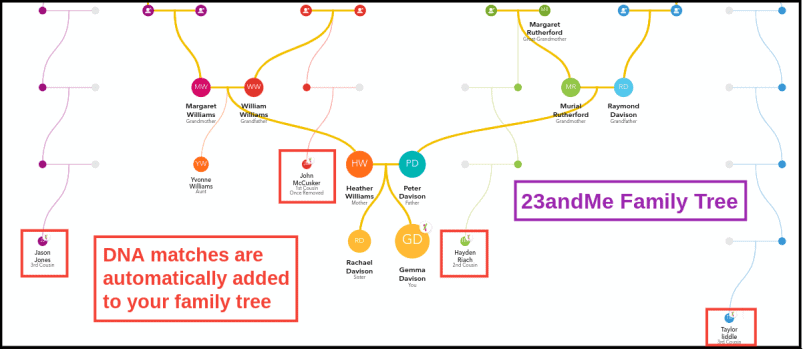
You can also link DNA matches to your family tree with FamilyTreeDNA depending on what ancestry test you take. The advantage of this is if you take an mtDNA or Y-DNA test, you’ll know that those DNA matches are from your maternal and paternal lineages respectively. This may prove useful if you’re trying to figure out where your DNA matches fit on your family tree.
FamilyTreeDNA arguably has the more active genealogy community. You can collaborate with other members on projects, such as exploring the history behind a shared surname and make new family connections for your tree in the process. You can investigate all the ongoing genealogy projects from FamilyTreeDNA users on the website.
And the winner is…FamilyTreeDNA, but only just! Neither family tree builder is probably going to have sufficient features for the serious genealogist, but FamilyTreeDNA just edges out the win. Its family tree builder is more established, there is an active genealogy community, and there are more DNA testing options to link to your tree.
Start Building Your Family Tree Today!
Learn More About Yourself with 23andMe’s Unique Features
Your ancestry reports from 23andMe and FamilyTreeDNA are not limited to your ethnicity estimate. Each company has its own unique features that add some extra value and intrigue to your results report.
FamilyTreeDNA focuses on providing deeper insights into your ancestry with its ancientOrigins feature, which compares your autosomal DNA to DNA found at archaeological dig sites throughout Europe. I haven’t seen anything like this from any other DNA testing company, and I think it gives some real validity to the ancient ancestry estimates.
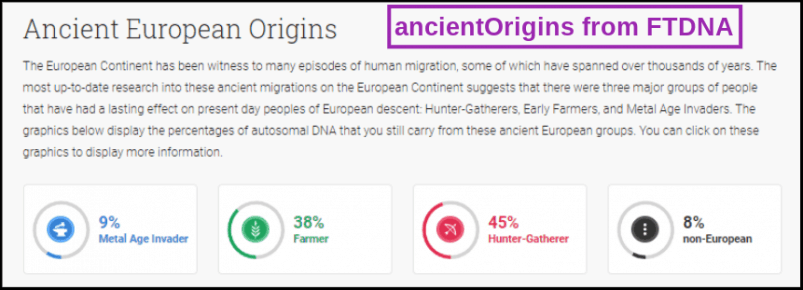
Included in your ancientOrigins report is a percentage breakdown of how much of your DNA is associated with three major groups of people associated with ancient European migrations:
- Metal Age Invader (Bronze Age)
- Farmer (Neolithic Era)
- Hunter-Gatherers (Mesolithic and Neolithic Eras)
The ancientOrigins interactive map provides interesting information about each ancient group, migration routes, and where the ancient autosomal DNA was obtained. It may seem like a limited feature if you don’t have European ancestry, but FamilyTreeDNA hopes to expand ancientOrigins to the outside of Europe in the future.
23andMe has a similar feature with its Neanderthal DNA report. It tells you the percentage of your DNA that can is Neanderthal in origin, as well as how many Neanderthal gene variants you have out of the 7,000+ they screen for. I found it fascinating that 23andMe can find the genetic signatures that have persisted in my DNA for more than 40,000 years.
Discover how your percentage of Neanderthal DNA compares to other 23andMe users and your DNA matches, as well as lots of fascinating facts about Neanderthals. You’ll also learn how your Neanderthal DNA variants may influence certain traits, such as a fear of heights, your sense of direction, whether you’re a better sprinter than a distance runner, and if you get hangry (angry when hungry).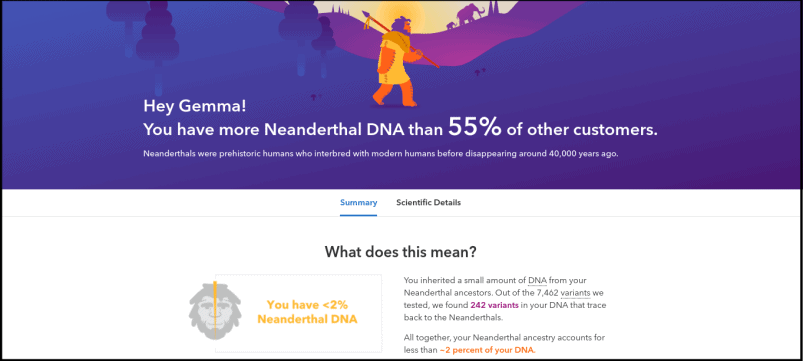
Speaking of traits, 23andMe provides 34 trait reports, which explore how your genetics may influence your appearance and senses. You’ll discover how your DNA predicts your eye color, ear lobe type, hair color and type, phobias, if you’re prone to motion sickness, or even if you have a photic sneeze reflex.
You’re sure to have fun reading through all the reports, and seeing where the predictions were bang on, and where you’re DNA hasn’t been your destiny.
And the winner is 23andMe! Your ancestry results from 23andMe include numerous interesting reports and extensive information on your regional, sub-regional DNA, as well as an insight into your Neanderthal DNA. Plus, you get to learn more about how your genetics influence who you are with trait reports.
You Get More Bang for Your Buck with 23andMe
Between the two companies, FamilyTreeDNA offers cheaper entry-level testing. With its stronger genealogical community, it’s probably better suited to you if you plan on taking advantage of collaborating on projects with other members.
However, the Family Finder test only analyzes your autosomal DNA. If you want to discover your maternal and paternal ancestry you need to purchase mtDNA and Y-DNA kits separately. You can buy all three tests for a bundle price, but the discount is pretty insignificant.
While mtDNA and Y-DNA analysis from FamilyTreeDNA is deeper than that from 23andMe, it is much more expensive, with prices starting at $119.00. 23andMe analyzes your autosomal, mtDNA, and Y-DNA in one test for just , plus you also get 34 trait reports too.
When it comes to health testing, 23andMe offers one of the most affordable tests on the market with the Health + Ancestry Kit costing just . You get everything from the Ancestry + Traits test, as well as over 60 genetic risk, carrier status, and wellness reports.
And the winner is 23andMe! The basic ancestry test from FamilyTreeDNA is cheaper than 23andMe’s Ancestry + Traits kit at $79.00However, for , you get so much more for your money with 23andMe, the major advantage being Y-DNA and mtDNA analysis being included.
If You Want Health Insights, Both Services are Good Options
With the health reports from 23andMe, you’ll learn how your DNA can affect your chances of developing certain conditions, your carrier status for dozens of congenital conditions, as well as how your genes influence several wellness factors.
Health Predisposition reports are available for 14 conditions that assess your genetic risk for Parkinson’s disease, breast cancer, type 2 diabetes, and more.
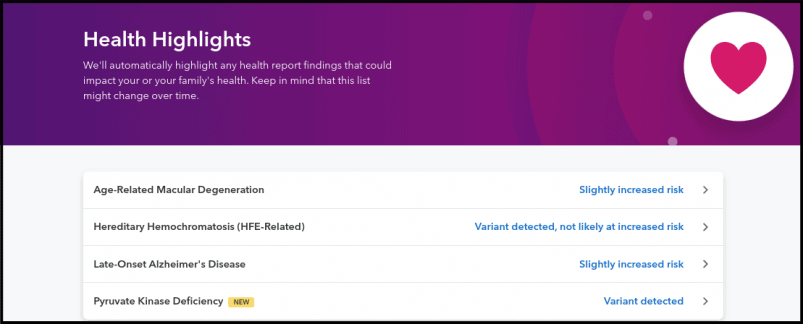
You also get Carrier Status reports which determine if you have certain genetic variants for over 40 congenital diseases, such as cystic fibrosis, sickle-cell anemia, and Bloom syndrome. Carrier screening from 23andMe can prove very useful on you’re planning on starting a family and want to be aware of the risks beforehand.
Then there are the eight wellness reports, which analyze your DNA to predict how your body responds to sleep, diet, and exercise. Learn about your genetic weight, muscle composition, sleep movement, alcohol flush reaction, and more.
With your health and wellness reports, you also get a personalized Health Plan that provides actionable insights on lifestyle changes, based on your genetics, that may reduce your risk. I found the advice to be simple to implement into my lifestyle and I appreciated the list of support options – including how to contact a genetic counselor – if you’re concerned about your results.
FamilyTreeDNA, at the same time, offers a Family Finder + myDNA wellness test which provides convenient and personalized nutrition and fitness insights based on your DNA. With over 30 actionable DNA insights, you’ll gain valuable information about your fitness, including power vs. endurance balance, injury prevention, stamina, and recovery. In the nutrition realm, it allows you to discover insights about caffeine sensitivity, skin health, B vitamins, bone health, heart health, sleep routine optimization, and iron levels.
As a member of the Family Finder + myDNA wellness test, you’ll enjoy a complimentary 30-day membership that grants you access to DNA-powered meal and workout plans that are meticulously tailored to your individual genetic makeup. These reports provide you with personalized macronutrient recommendations, precise calorie intake calculations, and the flexibility to choose your dietary preferences, resulting in a meal plan that is truly customized to your needs. Additionally, your workout plan is thoughtfully designed to maximize its effectiveness, taking into account your unique genetic fitness profile. It includes tailored exercise routines, recommended rep counts, and the option to choose between home or gym workouts to suit your preferences.
And the winner is 23andMe! If you’re looking for health insights along with your ancestry results, you’ll struggle to find a better value-for-money test than the Health + Ancestry kit from 23andMe!
Comparison Table
| FamilyTreeDNA | ||
| Sample Type | Cheek swab | Saliva |
| Time to Results | 2-8 weeks depending on the test | 4-6 weeks |
| Regions Covered | 90 | 1,400+ |
| Autosomal DNA Analysis | ✔ | ✔ |
| Maternal & Paternal Haplogroups | ✔ | ✔ |
| Sub-Regional Ancestry | ✔ | ✔ |
| Neanderthal Ancestry | ✘ | ✔ |
| DNA Matching | ✔ | ✔ |
| DNA Database Size | 2+ million | 12+ million |
| DNA Health Reports | ✘ | ✔ |
| Starting Price | $79.00 |
And the Overall Winner is…23andMe!
Thanks to extensive and detailed ancestry insights, 23andMe is the clear winner. It comes out on top in providing the best ancestry report, pricing, extra features, and health testing, while coming a very close second in DNA matching and family tree software.
Still, it comes down to personal choice. Yes, 23andMe has a more detailed ancestry report. It provides an accurate ethnicity estimate, digs deep into your heritage with mtDNA and Y-DNA testing, as well as identifying your ancestry down to the sub-regional and country level.
However, it’s hard to beat FamilyTreeDNA when it comes to discovering the geographical and ethnic origins of your maternal and paternal lines if you’re willing to pay a little extra for their mtDNA and Y-DNA tests.
Neither provider has a family tree builder suitable for the serious genealogist, but as both have large DNA databases and the ability to add DNA matches to your tree automatically, you’ll get a great start.
Overall, you can’t go wrong with either 23andMe or FamilyTreeDNA. They both give great insights into where you come from and help you make new connections with potential relatives.
FAQ
How long until you get your results from FamilyTreeDNA and 23andMe?
Your results from 23andMe should be ready in 4-6 weeks after the lab has received your samples. My results were ready in a little over five weeks, and I received updates on the progress of my kit throughout the testing process.
How long it takes to get your results from FamilyTreeDNA depends on which test you take. Family Finder results typically take between 2 to 4 weeks (mine arrived in just over 2 weeks), mtDNA results usually take between 6 to 8 weeks, and you can expect your Y-DNA results in 3 to 6 weeks with the exception of the Big Y-700 test, which takes 6-10 weeks.
How accurate is 23andMe?
23andMe is confident it can determine your ancestry down to the 0.1 percent by comparing thousands of small segments of your DNA to huge reference populations with established ethnicity. The precise algorithm 23andMe uses is very accurate, but your ethnicity estimate is still just that, an estimate.
Which FamilyTreeDNA Test is best?
That depends on what you’re looking to get from your results. To discover a breakdown of your ethnic and geographical ancestry, an insight into your ancient European ancestry, and DNA matches to find potential relatives, you’re sure to be satisfied with the Family Finder test.
However, if you want a deeper insight into the migration patterns of your ancient ancestors and trace your maternal and paternal lineages all the way back to Africa, you may want to choose mtDNA and Y-DNA testing.
Can 23andMe diagnose me with a disease?
No, 23andMe cannot detect or diagnose any health condition. The health report can tell you if you have specific gene variants that have been linked to an increased risk of developing certain conditions. It’s important to remember, that not all gene variants linked to genetic conditions are analyzed and lifestyle factors also play an important role in disease risk.
The carrier status reports indicate if you possess gene variants linked to congenital conditions that could be passed on to your children if your partner is also a carrier.
If you’re worried about your DNA results, or what they mean for your future health, consider discussing your results with a genetic counselor or your personal physician, who can help you better understand your risk.
Who should choose FamilyTreeDNA over 23andMe?
After weeks of research, I came to the conclusion that 23andMe has the better ancestry DNA testing, but for some FamilyTreeDNA may be a better fit.
If you want to learn about your family history and enjoy doing research in your spare time, then FamilyTreeDNA is a better fit for you over 23andMe. While 23andMe has more users, FamilyTreeDNA offers tools and resources a genealogist is likely going to value more.
FamilyTreeDNA has numerous projects you can work on with other members to discover details related to your surname or haplogroups. You can also link your DNA test results to a family tree and organize all your data in one visually appealing location.
I’m interested in building a family tree, should I choose 23andMe or FamilyTreeDNA?
You can start building your family tree for free with both 23andMe and FamilyTreeDNA. Plus both companies allow you to link your DNA test to your tree and contact your DNA matches, which can help expand your tree beyond your own personal knowledge. So, if you’re an amateur genealogist, just looking to start on your family history, either provider is a good option.
However, as you’re serious about building an extensive family tree that goes way beyond what you know, neither 23andMe nor FamilyTreeDNA is going to cut it as they don’t have databases of historical records or other premium genealogy features.
Ancestryand MyHeritage not only offer great ancestry DNA tests but also have excellent family tree building software, which includes access to huge databases of historical records if you sign up for a paid subscription. Plus, you can test them out before making a commitment as they both offer free 14-day trials.

